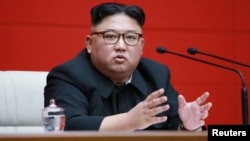North Korea might begin turning away from South Korean President Moon Jae-in after he failed to secure sanctions relief from U.S. President Donald Trump during his visit to the White House, experts said Thursday.
“We want sanctions to remain in place,” said Trump while in the Oval Office with Moon. “Frankly, I had the option of significantly increasing them. I didn’t want to do that because of my relationship with [North Korean leader] Kim Jong Un.”
Moon, who has made improving ties with North Korea and resuming inter-Korean projects central elements of his presidency, met with Trump in an attempt to reinvigorate denuclearization talks between Washington and Pyongyang, which have been deadlocked since the breakdown of the Hanoi summit held between Trump and Kim in February. On Thursday, Trump said he wanted his dialogue with Kim to continue, and that a third summit “could happen.”
“The important task that I face right now,” Moon said, “is to maintain the momentum of dialogue and also express the positive outlook, regarding the third U.S.-North Korea summit.”
Ken Gause, director of the International Affairs Group at the Center for Naval Analyses, said failing to move the U.S. position on sanctions could cost Moon his credibility with Kim.
“[The North Koreans] now probably are going to lose faith that President Moon can have any sort of influence inside Washington,” Gause said. “And if that’s the case, then North Korea will begin to turn its back on South Korea.”
‘Caught in between’
Douglas Paal, vice president for studies at the Carnegie Endowment for International Peace, said, “Obviously Trump does not want to surrender leverage over the North by offering sanctions relief.” He continued, “Moon is left caught in between.”
In Hanoi, Washington and Pyongyang failed to reach a deal on denuclearization. Kim asked Trump to lift sanctions imposed on North Korea in exchange for its offer to dismantle the Yongbyon nuclear facility, but Trump refused Kim’s demand and, in turn, asked him for complete denuclearization if he wanted all the sanctions removed.
Moon has been under pressure from North Korea to play a mediator’s role in brokering the talks between Washington and Pyongyang, which looked to him to influence Trump to relax sanctions.
“If South Korea is truly interested in North-South cooperation, it should tell the U.S. what it should be told,” said North Korea’s website Uriminzokkiri on Tuesday, according to Yonhap, the South Korean news agency.
Pyongyang’s official Korean Central News Agency (KCNA) reported Thursday that Kim urged his officials from the ruling Workers’ Party of Korea during a plenary session Wednesday to double their efforts at self-reliance to stand against “the hostile forces who go with bloodshot eyes miscalculating that sanctions can bring [North Korea] to its knees.”
Moon, who has been South Korea’s president since 2017, has been pushing for the resumption of inter-Korean economic projects, which include tourism to the fabled Mount Kumgang and manufacturing at the Kaesong Industrial Complex, since his first summit with Kim in April of last year. South Korean business owners who operated factories in the Kaesong complex from its opening in 2004 until it shut down in 2016 have been anticipating the opening of the industrial park.
“I think keeping sanctions in place sets real limits on the trajectory of North-South reconciliation, leaving reopening Kaesong Industrial Zone and Mount Kumgang tourist project off the table for now,” said Robert Manning, a senior fellow at the Atlantic Council.
“With his popularity sinking and the clock ticking on his presidential term, I think [Moon’s] hope for a grand legacy is up in the air,” he added.
Economic engagement
Before the Hanoi summit, Moon told Trump that he is willing to begin economic engagement with North Korea as a “concession” if it would help in negotiating a denuclearization deal with Kim.
Trump said at his summit with Moon on Thursday that “this isn’t the right time” to support South Korea’s engagement and concessions to North Korea.
“At the right time, I would have great support,” he said.
“When the right deal is made, and when the nuclear weapons are gone, I just think that North Korea has potential as great as anything I’ve ever seen in terms of potential,” Trump continued.
Trump reaffirmed the U.S. position on pursuing “the big deal,” which calls for full denuclearization of North Korea before the sanctions are lifted, although he said smaller deals could be discussed. Moon is a proponent of a “good enough deal” that would agree to a small step in the denuclearization process, such as North Korea dismantling Yongbyon in exchange for the U.S. declaring the end of the Korean War or opening a liaison office in Pyongyang.
“There are various smaller deals that maybe could happen,” Trump added. “You can work out, step-by-step pieces. But at this moment, we’re talking about the big deal. The big deal is we have to get rid of the nuclear weapons.”
But the Atlantic Council’s Manning wonders.
“I see no sign that they have done anything to break the diplomatic impasse,” he said. “There is no evidence that anything has changed” since the Hanoi summit.
Trump did not rule out having another summit with Kim and said that South Korea is “absolutely on the same page when it comes to the end state of the complete denuclearization of North Korea.”











